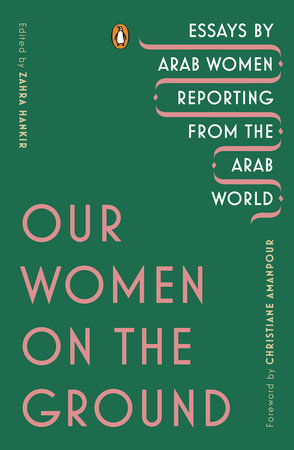Book Review: Our Women on the Ground: Essays by Arab Women Reporting from the Arab World
Written by Paula Kjdrian
16 June 2022

What is activism?
Is it demonstrations?
Protests?
Boycotts?
Strikes?
…Well, yes.
But activism is also breaking social constructs. It is taking the little scraps you have and threading them into a revolution. “Our Women on the Ground” was written by female Arab and Middle Eastern journalists — Sahafiya — and is yet another form of activism. With a collection of 19 essays, this book mirrors the internal and external struggles of being a woman and a journalist in the Arab world. The Lebanese-British journalist and the editor of this incredible book, Zahra Hankir, says “A sahafiya is twice burdened.” Which is why she invites everyone to listen to what they have to say as it might be surprising.
The book is divided into five parts: “Remembrances”, “Crossfire”, “Resilience”, “Exile”, and “Transition.”. Some feel like an obituary to a beloved husband and even to war. Some feel like letters to the backbones of Iraq, i.e., women, or to the cynical baba –father– who had a hard time accepting his daughter’s career. And many feel like testimonies, filled with guilt. In one essay, “Syria Undone” Zeina Karam asks, “Did we do them all justice in our reporting?” a question that is carefully stored in the attic of every journalist who has witnessed death more than accouchement. Natacha Yazbeck testifies, “Do you call a body an “it” anyway? We do, in our air-conditioned newsroom.” while mourning the death of Aylan Kurdi. Even in the introduction, Hankir admits herself as a fraud because of the privileges she carries.
Fortunately, guilt does not stop them from being loud about topics that are usually cut mid-sentence for being “sinful.” As these journalists struggle with mourning, motherhood, and womanhood with all its baggage, they are still feminists and human rights activists. In “On a Belated Encounter with Gender,” Lina Attalah asks, “How and why have homosexuals of different social classes been targeted differently by the state? How does class interfere with the women’s experience when undergoing abortions?” hoping that these questions will create riots in women’s minds. Moreover, in “Just Stop,” Eman Helal chooses to enrage the reader with both words and horrendous pictures that show what a woman endures daily in Cairo. However, Donna Abu-Nasr reminds women of their victories in “An Orange Bra in Riyadh.” Victories that might seem absurd to the modern mind, like being able to buy a bra at the store instead of a basement or even knowing your own cup size.
“Our Women on the Ground” is not merely a corpus of writings but a fundamental truth to humanity. While this book is dedicated “To Atwar Bahjat, Mayada Ashraf, Layal Nagib, Malika Sabour, and the Arab and Middle Eastern women journalists and photojournalists who lost their lives while reporting from their homelands,” Azad Archives dedicates this book review to Shireen Abu-Akleh.
Abu-Akleh devoted her life to raising the question of Palestine. The Palestinian-American journalist, known and loved by the Arab world, shot and killed by the Israeli forces on May 11, 2022, remains a role model to all women on the ground.
Rest In Power. Rest In Peace. Let justice be served from the river to the sea, for the rest of the world to see.
